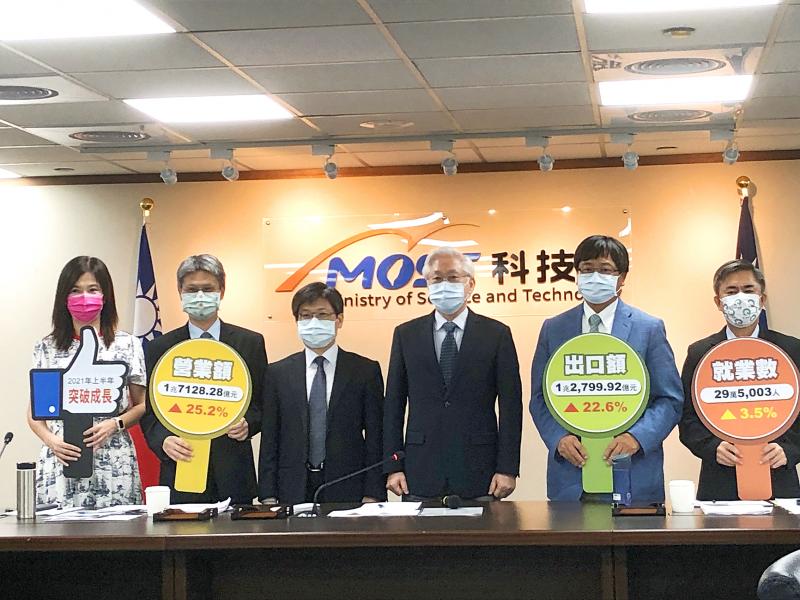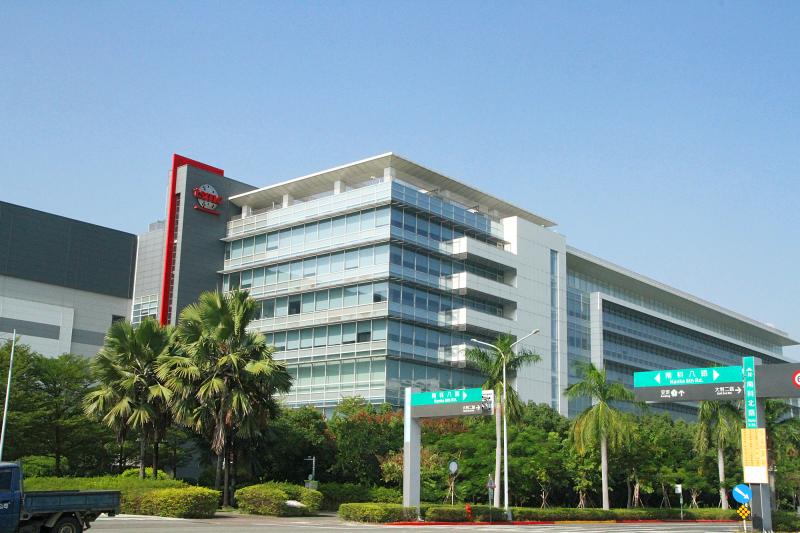Taiwan’s three science parks posted a record combined revenue of NT$1.71 trillion (US$61.69 billion) for the first half of this year, up 25.2 percent year-on-year and the fastest increase in almost eight years, the Ministry of Science and Technology told a news conference in Taipei yesterday.
The three parks — Hsinchu Science Park (新竹科學園區), the Central Taiwan Science Park (中部科學園區) and the Southern Taiwan Science Park (南部科學園區) — generated combined exports of about NT$1.28 trillion in the first six months of the year, also a new high, the ministry said.
The ministry attributed the the three science parks’ performance to continued global demand for 5G, high-performance computing and other new tech applications.

Photo: CNA
The three parks provided jobs for 295,000 people, up 3.5 percent year-on-year and also a new high, it said.
Imports to the parks totaled NT$493.08 billion, up 22.5 percent year-on-year, on increased prices of raw materials and electronic components, the ministry said.
Hsinchu Science Park posted revenue of NT$743.97 billion in the first half of the year, up 31.42 percent annually, thanks to growth in demand for electronics, and information and communications technology, as well as other high-tech products, the ministry said.

Photo: CNA
Central Taiwan Science Park reported revenue of NT$482.79 billion over the same period, up 11.48 percent year-on-year, mostly on continued demand for 5G, artificial intelligence, automotive electronics and high-performance computing applications.
Southern Taiwan Science Park, home to the most advanced 5-nanometer chip making process, saw revenue jump to NT$480.06 billion, up 31.74 percent year-on-year, the ministry said.
Minister of Science and Technology Wu Tsung-tsong (吳政忠) said that due to the stay-at-home economy and an increase in distance learning and working, the optical product sector shook off the doldrums experienced in the past few years years and revenue jumped 35.44 percent.
The integrated circuit sector placed second with regards to growth. It saw revenue grow 24.29 percent, while the computer and peripherals sector followed with an increase of 20.77 percent.
Taiwan Semiconductor Manufacturing Co (TSMC, 台積電), the world’s largest contract chipmaker, has a presence at all three science parks, accounting for 17 percent of overall revenue in Hsinchu Science Park, 42.27 percent in the Central Taiwan Science Park and 55 percent in the Southern Taiwan Science Park, ministry data showed.
TSMC made up 34 percent of the three science parks’ combined revenue, a slight decline from last year’s 41 percent, the data showed.
The ministry said it anticipates a continued increase in demand in the second half of the year as the global economic environment improves.
It predicted whole-year growth of 15 percent for the three science parks’ combined revenue this year.
Separately, TSMC’s rumored expansion in Kaohsiung is likely to help the chipmaker hedge against water shortage risks, Taiwan Institute of Economic Research (台灣經濟研究院) researcher Arisa Liu (劉佩真) told Central News Agency (CNA) yesterday.
Local media reported last week that TSMC is considering building a new 7-nanometer hub in Kaohsiung’s Linyuan District (林園).
Liu said that TSMC is “most likely” to invest in a new facility in Kaohsiung, as the three major science parks have become increasingly saturated with businesses.
“I anticipate with a TSMC foundry acting as a magnet, Kaohsiung can create a new semiconductor industrial cluster and that would be beneficial to balancing the development between the different regions in Taiwan,” Liu told CNA.

Sweeping policy changes under US Secretary of Health and Human Services Robert F. Kennedy Jr are having a chilling effect on vaccine makers as anti-vaccine rhetoric has turned into concrete changes in inoculation schedules and recommendations, investors and executives said. The administration of US President Donald Trump has in the past year upended vaccine recommendations, with the country last month ending its longstanding guidance that all children receive inoculations against flu, hepatitis A and other diseases. The unprecedented changes have led to diminished vaccine usage, hurt the investment case for some biotechs, and created a drag that would likely dent revenues and

Global semiconductor stocks advanced yesterday, as comments by Nvidia Corp chief executive officer Jensen Huang (黃仁勳) at Davos, Switzerland, helped reinforce investor enthusiasm for artificial intelligence (AI). Samsung Electronics Co gained as much as 5 percent to an all-time high, helping drive South Korea’s benchmark KOSPI above 5,000 for the first time. That came after the Philadelphia Semiconductor Index rose more than 3 percent to a fresh record on Wednesday, with a boost from Nvidia. The gains came amid broad risk-on trade after US President Donald Trump withdrew his threat of tariffs on some European nations over backing for Greenland. Huang further

CULPRITS: Factors that affected the slip included falling global crude oil prices, wait-and-see consumer attitudes due to US tariffs and a different Lunar New Year holiday schedule Taiwan’s retail sales ended a nine-year growth streak last year, slipping 0.2 percent from a year earlier as uncertainty over US tariff policies affected demand for durable goods, data released on Friday by the Ministry of Economic Affairs showed. Last year’s retail sales totaled NT$4.84 trillion (US$153.27 billion), down about NT$9.5 billion, or 0.2 percent, from 2024. Despite the decline, the figure was still the second-highest annual sales total on record. Ministry statistics department deputy head Chen Yu-fang (陳玉芳) said sales of cars, motorcycles and related products, which accounted for 17.4 percent of total retail rales last year, fell NT$68.1 billion, or

HSBC Bank Taiwan Ltd (匯豐台灣商銀) and the Taiwan High Prosecutors Office recently signed a memorandum of understanding (MOU) to enhance cooperation on the suspicious transaction analysis mechanism. This landmark agreement makes HSBC the first foreign bank in Taiwan to establish such a partnership with the High Prosecutors Office, underscoring its commitment to active anti-fraud initiatives, financial inclusion, and the “Treating Customers Fairly” principle. Through this deep public-private collaboration, both parties aim to co-create a secure financial ecosystem via early warning detection and precise fraud prevention technologies. At the signing ceremony, HSBC Taiwan CEO and head of banking Adam Chen (陳志堅)